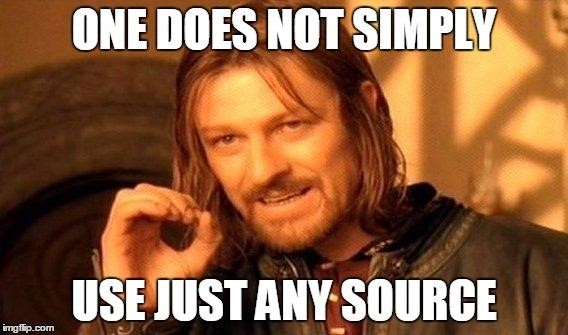Hey everybody! Have you ever been working on a paper and been confused about how to successfully find and identify credible sources? Well, today’s post is all about finding and identifying those elusive credible sources!
Firstly, it’s important to discuss how to find sources in general. Many students begin the process by searching for sources on Google. This can be fine, but you never know what you will find on Google and if the sources you find are actually credible. Thankfully, there are many other better ways to find credible sources, and they all stem from one beautiful place—UNCC’s library website!
Yes, http://library.uncc.edu/ is one of the best places you can start searching for credible sources. You can search for print books, online books, journal articles, peer-reviewed articles, etc.! When you begin working, it’s always better to start off in a place where you know sources are usually credible, like a database or an academic journal on the library’s website. However, if you’re unable to find any sources that tickle your fancy, there are still many options available to you. There are librarians who specialize in different subjects who can point you in the right direction, and if you are unable to reach a librarian, it’s always a good idea to go to your professor and ask for further help. If you use the resources that the library offers, it will really help you as you begin to sift through a variety of sources!
However, that being said, Google isn’t necessarily off limits! Furthermore, sometimes even sources that a database or library offer may not be credible. This is why it’s important to be able to identify a source’s credibility.
The next part of the process, identifying if a source is credible, can seem a bit tricky. However, there are various resources online that can help you determine a source’s credibility. Also, the more you do this, the more comfortable you will feel. As they say, practice makes perfect!
As you analyze your sources to check their credibility, it’s important to always question your sources. I’ve compiled a list of important questions to keep in mind from various resources, including the Purdue OWL, USC, Harvard, Cornell, NCSU, Berkeley, App State, etc., that you can keep in mind as you check sources for credibility.
- Who is the author? What are the author’s credentials? Are they qualified scholars on the subject they’re writing about?
-
- If the author is not a specialist/scholar on the topic they are writing about, the source may not be as factual or accurate as it should be.
- Does the author cite their sources? Are the sources that the author uses relevant and recent (i.e. published within the last five years of the article)?
- If the author doesn’t cite their sources, then that is definitely problematic, and they are most likely plagiarizing someone else’s work.
- What is the author’s point of view? Do they show an obvious bias in their writing?
- If the author seems biased in their writing, then the source may be inappropriate.
- What is the source’s purpose? Is the author trying to persuade you, or are they just taking part in an academic conversation? Is this source a form of propaganda, or is it simply informative?
- If the purpose of the source is to persuade you, then it may be possible that the author is writing with bias. Keep that in mind!
- Who was the source written for? Who is the intended audience? Is the intended audience a particular group of people?
- Depending on who the audience is, the source may or may not be appropriate for your paper because it may or may not be biased.
- Who published the source? Was the source peer-reviewed? Do any particular companies or organizations sponsor the publisher? Does the publisher identify with one particular viewpoint (i.e. conservative or progressive)?
- Depending on who the publisher is and what kind of organizations sponsor them, the source may or may not be biased. This is something to keep in mind as you analyze your source!
- What is the title of source?
-
- This question may seem silly or redundant, but sometimes sources with wacky titles or so-called “clickbait” headings are evidence of a non-credible source!
- When was the source published? Was the source published within the last five years or was it last edited a long time ago, like in 1986?
-
- If the source wasn’t published recently, (like, I usually use the last five years as my scope,) then the source may be outdated or irrelevant. However, this doesn’t necessarily mean that the source is not credible/useful. For example, if you’re writing a paper about how medical science literature has drastically changed throughout history, then using a source from 1986 would be totally fine.
- What’s the medium of the source? Is it print or is it an online text?
- If it’s print text, that’s usually a good sign because it has to (traditionally) go through many processes that fact-check it. However, if it’s an online source that you found on Google, anybody could be the author and any of the information could be inaccurate! This is why it’s important to check and double check a source’s credibility.
These are only a few questions that you can keep in the back of your mind as you analyze sources to check their credibility. This is a lot of new information, so take some time to let it all seep into your brain and marinate. On the next blog post, you will have an opportunity to evaluate source credibility on your own, so stay tuned for Evaluating Sources in Practice next week!
–Katherine
Resources Consulted:
http://library.ucsc.edu/help/research/evaluate-the-quality-and-credibility-of-your-sources
https://owl.english.purdue.edu/owl/resource/553/01/
https://owl.english.purdue.edu/owl/resource/553/02/
http://isites.harvard.edu/icb/icb.do?keyword=k70847&tabgroupid=icb.tabgroup107786
https://digitalliteracy.cornell.edu/tutorial/dpl3221.html
https://www.lib.ncsu.edu/tutorials/evaluating-sources/
http://guides.lib.berkeley.edu/evaluating-resources
http://guides.library.jhu.edu/c.php?g=202581&p=1334914
http://www.usg.edu/galileo/skills/unit07/internet07_08.phtml



